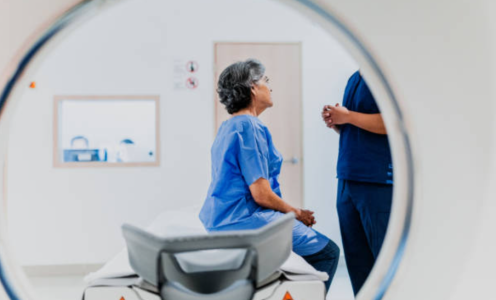Terminally ill mum travels to China for treatment after losing options at home
By
Gian T
- Replies 0
Imagine being told you have the most aggressive form of brain cancer, only to learn that the one surgeon you trust to save your life is banned from operating in your own country.
That’s the devastating reality facing a mother of six from Australia, who is now gearing up for her second trip to China in just eight months, clinging to the hope of securing more precious time with her loved ones.
Tanya Miles’ story is both inspiring and infuriating. Diagnosed with glioblastoma (GBM)—a particularly aggressive and deadly brain tumour—she’s been forced to make impossible choices.
After her diagnosis in November 2024, Tanya did what any determined mum would do: she researched every possible option, determined to find the best chance at survival.
Her search led her to Dr Charlie Teo, a world-renowned neurosurgeon known for taking on the toughest cases.
But here’s the catch: Dr Teo is no longer allowed to perform certain high-risk surgeries in Australia without special written permission.
This restriction came after the Medical Professional Standards Committee found him guilty of unsatisfactory professional conduct, following concerns that he operated on patients where the risks may have outweighed the benefits.
The Health Care Complaints Commission also raised questions about whether patients were given realistic expectations.
For Tanya, the politics and red tape are a bitter pill to swallow. 'No one should have to leave their own country, their friends and their family, travel to a foreign country to have high-risk surgery. It makes me so angry,' she said.
'Australian patients are suffering, their choices are restricted, and because of politics, they’re being stopped from having the best surgeon in the world when it comes to these deadly tumours. It’s just not good enough.'
Eight months ago, Tanya, her son, and her best friend flew to Wuzhishan, China, spending over $100,000 for Dr Teo to perform a radical resection of her tumour.
The surgery was a success—her post-op MRI showed only black space where the tumour had been.
For a while, Tanya felt 'good as gold.' But with GBM, the threat is never far away. Most patients survive less than 14 months after diagnosis, and the risk of recurrence is high.
Recently, Tanya began experiencing headaches. A new scan showed changes, but doctors couldn’t say for sure if it was a new tumour or damage from previous radiation. The only way to know for certain? More surgery.
She reached out to Dr Teo, who was in Ethiopia at the time, and he referred her to a trusted Australian colleague.
But when Tanya asked if the local doctor could do what Dr Teo could, the answer was clear: 'He agreed I should go to Charlie in China.'
So, Tanya is packing her bags again—this time with her best friend and two of her sons. The emotional and financial toll is immense.
'It’s just so hard to go through all of this, but to have to do it so far away, away from my other children, the rest of my family, it’s too much and it’s unfair,' she said.
The Bigger Picture: Patient Choice and Medical Regulation in Australia Tanya’s story raises some big questions about patient rights, medical regulation, and the balance between safety and choice.
On one hand, medical authorities have a duty to protect patients from unnecessary risk and ensure that surgeons are held to the highest standards.
On the other, shouldn’t patients facing terminal illness have the right to choose their own path—even if it’s risky?
Dr Teo’s supporters argue that he offers hope where others see none, and that his willingness to take on 'impossible' cases has given many families precious extra time.
Critics, however, worry that desperate patients may be given false hope or that the risks of surgery are downplayed.
For families like Tanya’s, the debate isn’t just academic—it’s deeply personal. The cost of travelling overseas for treatment is enormous, both financially and emotionally.
Not everyone can afford it, and not everyone has the support network to make such a journey possible.
The Cost of Medical Tourism Tanya’s experience is part of a growing trend known as 'medical tourism,' where Australians travel overseas for procedures they can’t access at home.
While some seek cheaper dental work or cosmetic surgery, others—like Tanya—are chasing life-saving treatments.
But medical tourism comes with its own risks: unfamiliar hospitals, language barriers, and the stress of being far from home during recovery.
Tanya’s journey isn’t over. She’s heading back to China, hoping for another successful surgery and more time with her family.
But she’s also speaking out, calling for change. 'Someone needs to exercise some common sense and allow Dr Teo to operate in Australia. People should have the choice; you shouldn’t be able to take that away from them when they are fighting for their lives.'
 Have you or someone you know faced a similar situation, where medical options in Australia felt limited, or you had to travel overseas for treatment? Do you think patients should have the right to choose riskier procedures if it’s their only hope? Or do you believe strict regulations are necessary to protect vulnerable people? Share your thoughts and experiences in the comments below.
Have you or someone you know faced a similar situation, where medical options in Australia felt limited, or you had to travel overseas for treatment? Do you think patients should have the right to choose riskier procedures if it’s their only hope? Or do you believe strict regulations are necessary to protect vulnerable people? Share your thoughts and experiences in the comments below.
Read more: She believed the TV star wanted to marry her, then scammers demanded $40 million
That’s the devastating reality facing a mother of six from Australia, who is now gearing up for her second trip to China in just eight months, clinging to the hope of securing more precious time with her loved ones.
Tanya Miles’ story is both inspiring and infuriating. Diagnosed with glioblastoma (GBM)—a particularly aggressive and deadly brain tumour—she’s been forced to make impossible choices.
After her diagnosis in November 2024, Tanya did what any determined mum would do: she researched every possible option, determined to find the best chance at survival.
Her search led her to Dr Charlie Teo, a world-renowned neurosurgeon known for taking on the toughest cases.
But here’s the catch: Dr Teo is no longer allowed to perform certain high-risk surgeries in Australia without special written permission.
This restriction came after the Medical Professional Standards Committee found him guilty of unsatisfactory professional conduct, following concerns that he operated on patients where the risks may have outweighed the benefits.
The Health Care Complaints Commission also raised questions about whether patients were given realistic expectations.
For Tanya, the politics and red tape are a bitter pill to swallow. 'No one should have to leave their own country, their friends and their family, travel to a foreign country to have high-risk surgery. It makes me so angry,' she said.
'Australian patients are suffering, their choices are restricted, and because of politics, they’re being stopped from having the best surgeon in the world when it comes to these deadly tumours. It’s just not good enough.'
Eight months ago, Tanya, her son, and her best friend flew to Wuzhishan, China, spending over $100,000 for Dr Teo to perform a radical resection of her tumour.
The surgery was a success—her post-op MRI showed only black space where the tumour had been.
For a while, Tanya felt 'good as gold.' But with GBM, the threat is never far away. Most patients survive less than 14 months after diagnosis, and the risk of recurrence is high.
Recently, Tanya began experiencing headaches. A new scan showed changes, but doctors couldn’t say for sure if it was a new tumour or damage from previous radiation. The only way to know for certain? More surgery.
But when Tanya asked if the local doctor could do what Dr Teo could, the answer was clear: 'He agreed I should go to Charlie in China.'
So, Tanya is packing her bags again—this time with her best friend and two of her sons. The emotional and financial toll is immense.
'It’s just so hard to go through all of this, but to have to do it so far away, away from my other children, the rest of my family, it’s too much and it’s unfair,' she said.
The Bigger Picture: Patient Choice and Medical Regulation in Australia Tanya’s story raises some big questions about patient rights, medical regulation, and the balance between safety and choice.
On one hand, medical authorities have a duty to protect patients from unnecessary risk and ensure that surgeons are held to the highest standards.
Dr Teo’s supporters argue that he offers hope where others see none, and that his willingness to take on 'impossible' cases has given many families precious extra time.
Critics, however, worry that desperate patients may be given false hope or that the risks of surgery are downplayed.
For families like Tanya’s, the debate isn’t just academic—it’s deeply personal. The cost of travelling overseas for treatment is enormous, both financially and emotionally.
Not everyone can afford it, and not everyone has the support network to make such a journey possible.
The Cost of Medical Tourism Tanya’s experience is part of a growing trend known as 'medical tourism,' where Australians travel overseas for procedures they can’t access at home.
But medical tourism comes with its own risks: unfamiliar hospitals, language barriers, and the stress of being far from home during recovery.
Tanya’s journey isn’t over. She’s heading back to China, hoping for another successful surgery and more time with her family.
But she’s also speaking out, calling for change. 'Someone needs to exercise some common sense and allow Dr Teo to operate in Australia. People should have the choice; you shouldn’t be able to take that away from them when they are fighting for their lives.'
Key Takeaways
- An Australian mum of six, Tanya Miles, must travel to China for life-saving brain surgery by Dr Charlie Teo, as he is banned from performing certain operations in Australia.
- Ms Miles is angry that patients like her are left with limited options and forced to leave the country, saying the restrictions deny them access to the best possible care.
- Dr Teo’s ban in Australia stems from findings of unsatisfactory professional conduct, meaning patients in need of his expertise are left seeking treatment overseas at significant personal and financial cost.
- Ms Miles highlights the emotional and practical hardship of undergoing major surgery away from her family, urging authorities to use common sense and allow patients greater freedom of choice for life-saving procedures.
Read more: She believed the TV star wanted to marry her, then scammers demanded $40 million








